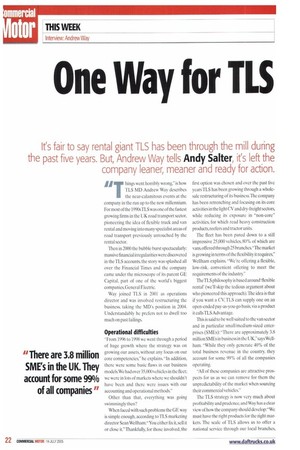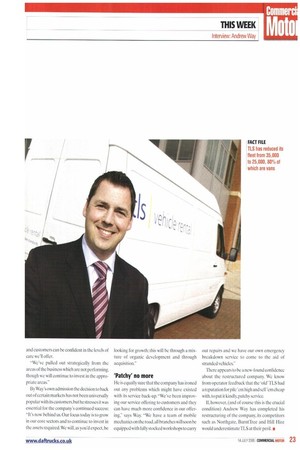One Way for TLS
Page 22

Page 23

If you've noticed an error in this article please click here to report it so we can fix it.
It's fair to say rental giant TLS has been through the mill during
the past five years. But, Andrew Way tells Andy Salter, it's left the
company leaner, meaner and ready for action.
AuT hings went horribly wrong," is how TLS MD Andrew Way describes the near-calamitous events at the company in the run up to the new millennium. For most of the 1990s TLS was one of the fastest growing firms in the UK road transport sector, pioneering the idea of flexible truck and van rental and moving into many specialist areas of road transport previously untouched by the rental sector.
Then in 2000 the bubble burst spectacularly: massive financial irregularities were discovered in the TLS accounts, the story was splashed all over the Financial Times and the company came under the microscope of its parent GE Capital, part of one of the world's biggest companies, General Electric.
Way joined TLS in 2001 as operations director and was involved restructuring the business, taking the MD's position in 2004. Understandably he prefers not to dwell too much on past failings.
Operational difficulties
From 19% to 1998 we went through a period of huge growth where the strategy was on growing our assets, without any focus on our core competencies," he explains. "In addition, there were some basic flaws in our business models. We had over 35,000 vehicles in the fleet; we were in lots of markets where we shouldn't have been and there were issues with our accounting and operational methods."
Other than that, everything was going swimmingly then?
When faced with such problems the GE way is simple enough, according to TLS marketing director Sean Well ham:"You either fix it, sell it or close it."'Thankfully, for those involved, the first option was chosen and over the past five years TLS has been growing through a wholesale restructuring of its business.The company has been retrenching and focusing on its core activities in the light CV and dry-freight sectors, while reducing its exposure in "non-core" activities, for which read heavy construction products, reefers and tractor units.
The fleet has been pared down to a still impressive 25,000 vehicles, 80% of which are vans, offered through 25 branches, "The market is growing in terms of the flexibility it requires," Wellham explains. "We're offering a flexible, low-risk, convenient offering to meet the requirements of the industry."
The TLS philosophy is based around 'flexible rental' (we'll skip the tedious argument about who pioneered this approach ). The idea is that if you want a CV, TLS can supply one on an open-ended pay-as-you-go basis, via a product it calls TLS Advantage.
This is said to be well suited to the van sector and in particular small/medium-sized enterprises (SMEs): "There are approximately 3.8 million SMEs in business in the UK,says Wellham. "While they only generate 40% of the total business revenue in the country, they account for some 99% of all the companies operating.
"All of these companies are attractive prospects for us as we can remove for them the unpredictability of the market when sourcing their commercial vehicles."
The TLS strategy is now very much about profitability and prudence, and Way has a clear view of how the company should develop: "We must have the right products for the right markets. The scale of TLS allows us to offer a national service through our local branches, and customers can be confident in the levels of care we'll offer.
-We've pulled out strategically from the areas of the business which are not performing, though we will continue to invest in the appropriate areas."
By Way's own admission the decision to back out of certain markets has not been universally popular with its customers, but he stresses it was essential for the company's continued success: -It's now behind us. Our focus today is to grow in our core sectors and to continue to invest in the assets required. We will, as you'd expect, be looking for growth; this will be through a mixture of organic development and through acquisition."
'Patchy' no more
He is equally sure that the company has ironed out any problems which might have existed with its service back-up. "We've been improving our service offering to customers and they can have much more confidence in our offering,says Way. "We have a team of mobile mechanics on the road, all branches will soon be equipped with fully stocked workshops to carry out repairs and we have our own emergency breakdown service to come to the aid of stranded vehicles."
There appears to be a new-found confidence about the restructured company. We know from operator feedback that the 'old' TLS had a reputation for pile 'em high and sell 'em cheap with, to put it kindly, patchy service.
IL however, (and of course this is the crucial condition) Andrew Way has completed his restructuring of the company, its competitors such as Northgate, BurntTree and Hill Hire would underestimate TLS at their peril. •










































































































































































































